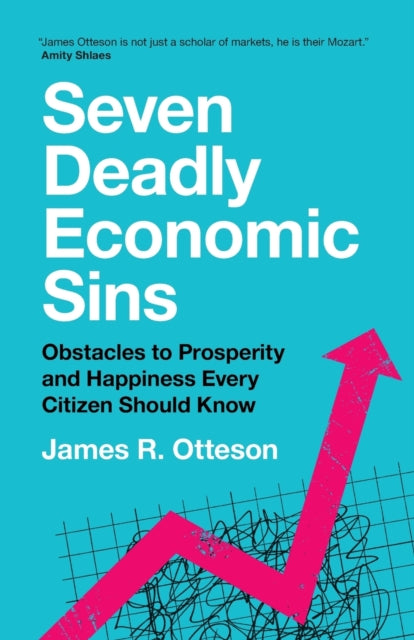James R. Otteson
Seven Deadly Economic Sins: Obstacles to Prosperity and Happiness Every Citizen Should Know
Seven Deadly Economic Sins: Obstacles to Prosperity and Happiness Every Citizen Should Know
YOU SAVE £1.72
- Condition: Brand new
- UK Delivery times: Usually arrives within 2 - 3 working days
- UK Shipping: Fee starts at £2.39. Subject to product weight & dimension
Bulk ordering. Want 15 or more copies? Get a personalised quote and bigger discounts. Learn more about bulk orders.
Couldn't load pickup availability
- More about Seven Deadly Economic Sins: Obstacles to Prosperity and Happiness Every Citizen Should Know
The Seven Deadly Sins are natural human weaknesses that can lead to economic sins such as waste, loss, and forgone prosperity. James Otteson's book explains why these fallacies are fallacies, why believing in them leads to mistakes and loss, and how exorcizing them from our thinking can help us avoid costly errors and enable us to live in peace and prosperity.
Format: Paperback / softback
Publication date: 27 April 2023
Publisher: Cambridge University Press
The Seven Deadly Sins, a set of inherent human weaknesses, encompass a range of negative behaviors that hinder happiness. These sins, including pride, greed, lust, envy, gluttony, wrath, and sloth, are deeply ingrained in our nature. However, the realm of economics also harbors its own set of sins, which have equally devastating consequences on individuals and society as a whole. These economic sins, while initially captivating and intuitively appealing, ultimately lead to waste, loss, and the forfeiture of prosperity. In his insightful and thought-provoking book, James Otteson delves into the story of seven central economic fallacies, shedding light on their nature, the errors they perpetuate, and the detrimental effects they have on our lives and economic well-being.
The first fallacy, the belief in the scarcity of resources, suggests that there are limited resources available to us, leading to competition and conflict over scarce resources. This fallacy leads to inefficient resource allocation, as individuals and organizations strive to hoard resources for their own benefit, resulting in waste and inefficiencies. The second fallacy, the belief in the power of markets, asserts that markets are self-regulating and can solve all economic problems. This fallacy overlooks the fact that markets are subject to external factors such as government policies, regulations, and market manipulation, which can lead to market instability and economic downturns.
The third fallacy, the belief in the efficiency of competition, posits that competition leads to innovation, efficiency, and consumer benefits. While competition can be beneficial in certain contexts, it can also lead to anti-competitive practices, such as price fixing, monopolies, and predatory behavior, which harm consumers and undermine the overall efficiency of the economy. The fourth fallacy, the belief in the benefits of globalization, asserts that increased trade and international cooperation can lead to economic growth and prosperity. While globalization has brought about some benefits, it has also contributed to income inequality, job loss, and environmental degradation.
The fifth fallacy, the belief in the power of technology, asserts that technology can solve all economic problems and lead to economic growth. While technology has undoubtedly transformed the economy, it has also created new challenges, such as job displacement, income inequality, and environmental degradation. The sixth fallacy, the belief in the benefits of austerity, asserts that cutting government spending and reducing the deficit can lead to economic growth and prosperity. While austerity measures may have short-term benefits, they can also have long-term negative consequences, such as reduced economic growth, increased poverty, and reduced social welfare.
The seventh fallacy, the belief in the power of government, asserts that government can solve all economic problems and lead to economic growth. While government can play a role in promoting economic growth and stability, it can also be a source of corruption, inefficiency, and waste. In conclusion, the Seven Deadly Sins of economics, including the belief in the scarcity of resources, the power of markets, the efficiency of competition, the benefits of globalization, the power of technology, the benefits of austerity, and the power of government, have profound consequences on our lives and economic well-being. By recognizing and exorcizing these fallacies from our thinking, we can help to avoid costly errors and enable us to live in peace and prosperity. It is essential to approach economic issues with a critical and nuanced mindset, seeking to understand the underlying principles and factors that drive economic behavior. By doing so, we can create a more sustainable and equitable economic system that benefits all individuals and promotes long-term economic growth and stability.
ISBN-13: 9781108824385
This item can be found in:
UK and International shipping information
UK and International shipping information
UK Delivery and returns information:
- Delivery within 2 - 3 days when ordering in the UK.
- Shipping fee for UK customers from £2.39. Fully tracked shipping service available.
- Returns policy: Return within 30 days of receipt for full refund.
International deliveries:
Shulph Ink now ships to Australia, Belgium, Canada, France, Germany, Ireland, Italy, India, Luxembourg Saudi Arabia, Singapore, Spain, Netherlands, New Zealand, United Arab Emirates, United States of America.
- Delivery times: within 5 - 10 days for international orders.
- Shipping fee: charges vary for overseas orders. Only tracked services are available for most international orders. Some countries have untracked shipping options.
- Customs charges: If ordering to addresses outside the United Kingdom, you may or may not incur additional customs and duties fees during local delivery.


